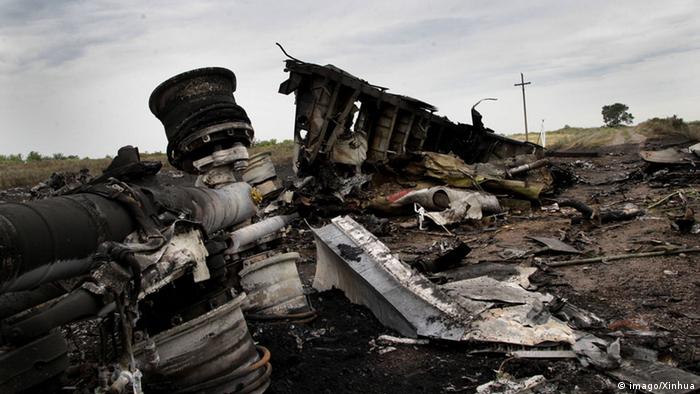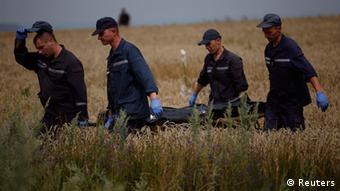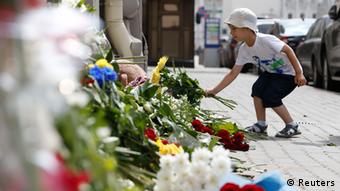Friedemann: Flight recorders can't answer all questions
Friedemann: Flight recorders can't answer all questions
German experts will be involved in the process of clearing up the details of the Ukraine plane crash. Jens Friedemann from the German Federal Bureau of Aircraft Accident Investigation lays out the various challenges.
298 people were killed in the plane crash in Ukraine. The victims were mostly Dutch; four Germans also died. German transport minister Alexander Dobrindt (CSU) has sent the director of theBundesstelle für Flugunfalluntersuchung (BFU, German Federal Bureau of Aircraft Accident Investigation) and a BFU expert to Ukraine, according to a statement by the German transport ministry published on Sunday (20.07.2014). Together with experts from other countries, they will attempt to clear up the reasons for the crash. DW spoke with aviation Jens Friedemann.
Deutsche Welle: Mister Friedemann, what exactly do you look into when a plane has crashed?
Jens Friedemann: When you investigate a wreck on the crash site you have to find out just how the plane crashed there – in one piece or did it lose bits on the way down? What lateral and longitudinal inclination did it have? It's about finding out whether the jet engines were running and similar pieces of information. From the position of the wreck you can deduce whether the plane broke apart in high altitude. And investigation experts hear eye witnesses on the ground.
In addition, you retrieve data recorded by the radar system: altitude, flight route, and speed. Radio traffic is also checked.
Planes carry various data mediums: the flight recorder stores technical parameters; rotary speed, fuel flow, speed – several hundred parameters are recorded. The cockpit voice recorder records voices and sounds in the cockpit. And many more data recorders which are not necessarily crash-proof. They also carry data, but they may have been destroyed in the crash.
How difficult is it to find the flight recorders?
They have a special color to make it easier to find them. If you know what you're looking for and where they're installed they're easy enough to find. They're fixed so as to avoid them falling out.
How important are flight recorders in determining the cause of the crash?
Don't think you can just take the recorder and you'll suddenly find all questions answered. A crucial part can be deducted from the recorder – but not everything. In a nutshell, you've got three areas of investigation: one, everything concerning people on board, above all pilots. How experienced were they? Which special trainings did they receive? How many hours had they been on duty? The second part regards technology. You take a close look at suspicious cracks and damage on the wreck; and you check the maintenance history of certain systems. The third part are external factors, such as weather, flight safety and peculiarities concerning the airspace. It's about how all of those factors play together.
When you check satellite data would you be able to identify missiles ?
That depends on which satellites are available, and of course on whether we've got the information at all. Some satellites have the technological capacity to record certain things, others don't. In general it is possible that all kinds of things can be identified. But in this current case I don't know the answer to that question.
Have you ever investigated a plane shot down by a missile?
No, I've never had such a case before.
When do federal agencies for plane crashes take action?
The Chicago agreement stipulates what to do in terms of investigating plane crashes and heavy damage of commercial aircraft. The vast majority of countries in the world have signed the agreement. It clearly sets out who has to launch an investigation and who is allowed to and who has to take part in the investigation. The countries where the plane was manufactured have the right to take part, as does the state where the airline is based. There are certain rights for those countries whose citizens were among the victims.
In general there are several investigations after a crash. Identification of victims can be carried out with the help of experts from, in Germany's case, the Federal Criminal Police Office (BKA). Some part of the investigation concerns federal prosecution. International police bodies are involved in that. They try to identify people who may have to be charged. And independently of all of this, there's an investigation into the causes of the crash. According to the Chicago agreement, international entities have to be involved, such as the BFU.
Jens Friedemann is an aviation expert with the German Federal Bureau of Aircraft Accident Investigation and has decades' worth of experience in investigating airplane crashes.
The interview was conducted by Nils Naumann. dw de



Comments